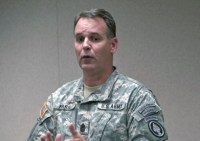General Ray Odierno, the Army chief of staff, speaking Tuesday.
As the Iraqi city of Fallujah fell to al-Qaeda-linked insurgents last weekend, former Marine Paul Szoldra posed a pertinent question on behalf of the roughly 100 U.S. troops who died freeing the city from such militants a decade ago, and the 4,400 others who were killed elsewhere in the country.
“Tell me again,” he asked, “why did my friends die in Iraq?”
On Tuesday, General Ray Odierno, the Army chief of staff — who spent five years commanding troops in Iraq — was asked to answer that question during a talk at the National Press Club. Highlights of his answer:
The bottom line is, we raise our right hand in order to defend the Constitution of the United States. And when we do that, we are prepared to go forward and do what is necessary as we’re asked to do by our civilian leadership in order to provide security for this nation…
We raised our right hand, we did and our job…
It’s difficult to deal with lives lost in Iraq. It’s difficult to — with lives lost that are lost to a car accident of a military member or a suicide of a military member because we’re brother- and sister-in-arms, and there’s a relationship there that’s built that you’ll never forget. And so I can never explain properly to anybody when somebody gives their life…
But the bottom line, what I do know, in each and every one of those cases, they raised and volunteered to be in the military because they were proud to be part of the Army…
Many of them died doing the things that they wanted to do.
Chris Faris, the command sergeant major of U.S. Special Operations Command, was asked the same question Thursday on a trip to Washington from SOCOM headquarters in Tampa, Fla. Being an enlisted guy, his answer was shorter:
The reason why they died was so that the Iraqis on their own right now, with no help, can have this war. … To address the Marine, here is what I would tell the Marine: so that they could have this war. Marine, when you finished in Fallujah, were you really that naive to think that they weren’t going to have another civil war after us?
Couldn’t they have had that civil war without American help?
“That’s a policy decision,” the nation’s top enlisted commando said. “The military doesn’t decide to go to war—everybody that lives in this town decides when we go to war.”


